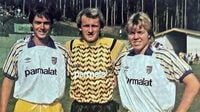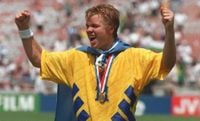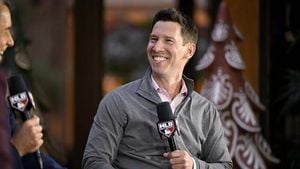In a world where football often seems to revolve around tradition, loyalty, and the relentless pursuit of glory, the game is currently witnessing a pair of stories that challenge the very fabric of its established norms. This week, two headline-grabbing developments have sent ripples across the footballing landscape: UEFA’s unprecedented decision to permit official league matches outside Europe, and the remarkable career reinvention of Swedish football legend Tomas Brolin. Both tales, though vastly different, touch on the shifting boundaries of what defines success and belonging in the sport.
Let’s start with the bombshell from UEFA headquarters. On October 7, 2025, the governing body of European football officially accepted extraordinary requests from both LALIGA and Serie A to stage league fixtures far from their home turf—and, indeed, their home continent. In a move that’s sparked fierce debate, Barcelona will face Villarreal in December 2025, not in Spain, but in the United States, as part of LaLiga’s 17th round. Even more astonishing, Milan is set to meet Como 1907 in February 2026, not at the San Siro or Stadio Giuseppe Sinigaglia, but in Perth, Australia—over 13,000 kilometers from Italian soil.
This decision, while historic, has not come without controversy. UEFA itself has made no secret of its reluctance, stating that it was compelled to approve the request due to regulatory ambiguities, despite the move running counter to its core principles and ideals. The organization’s hands were effectively tied, a reality that has left many traditionalists and fans scratching their heads. But perhaps no reaction has been as pointed as that of Marco van Basten, the legendary Dutch striker and two-time Ballon d’Or winner, who spent much of his illustrious career at AC Milan—one of the clubs directly involved in this new experiment.
Van Basten, never one to mince words, voiced his deep frustration in a recent interview with Rondo. “You have a league that is played in Spain or in Italy and suddenly you’re playing the same league on the other side of the world. Your home advantage is totally different. It’s crazy for your own supporters,” he declared, pulling no punches. The Dutchman continued, “What kind of comedy is this? I really don’t get it, it seems crazy to me. It’s a lack of appreciation for your fans and your country.”
His criticisms didn’t stop there. Van Basten, who is revered for his candor as much as his footballing prowess, added, “And it’s also a failure of the league, which is being distorted. Why does one team play as the home side far away while another doesn’t? It’s not right, it’s a distortion of the competition and it should be banned.” For Van Basten, the heart of the issue is fairness and the sanctity of the competition—a view that resonates with many fans who worry that moving league matches abroad is a step too far in the name of commercial expansion.
The matches in question are more than just logistical novelties. The Barcelona vs. Villarreal clash, slated for December in the U.S., is a regular league fixture, not a preseason friendly or exhibition. Likewise, Milan’s encounter with Como 1907 in Perth will count toward Serie A standings. For supporters, this means a home fixture is now an international event, with all the attendant challenges: time zone differences, travel logistics, and, perhaps most importantly, the loss of that intangible but vital home advantage. It’s a scenario that, as Van Basten argues, fundamentally alters the competitive balance of the league.
UEFA’s reluctant green light could well be a one-off, with indications that future requests may face greater scrutiny. Still, the genie is out of the bottle. The footballing world will be watching closely to see how fans, players, and clubs respond to this bold experiment. Is this the dawn of a new global era for domestic leagues, or a fleeting anomaly destined to be rolled back? Only time will tell.
While the debate over league matches abroad rages on, another story has captured the imagination of football fans for entirely different reasons. Tomas Brolin, the Swedish star whose career burned brightly in the 1990s, is back in the spotlight—not for a return to the pitch, but for his success in a field no one could have predicted: vacuum cleaner entrepreneurship.
Brolin’s footballing journey is the stuff of legend. He played in two World Cups, was the top scorer at Euro 1992, and helped Sweden to a historic third-place finish at the 1994 World Cup in the United States. At Parma, he was instrumental in winning the UEFA Cup, European Super Cup, Cup Winners’ Cup, and the Italian Cup, cementing his place among the game’s elite. In 1994, he finished fourth in the Ballon d’Or voting, trailing only the likes of Stoichkov, Baggio, and Maldini.
Yet, at the age of just 28, Brolin stunned the football world by retiring from the professional game. The reason? Not injury, scandal, or decline, but a desire to pursue something entirely different. “Initially it was fun to train every day, but towards the end it wasn’t,” Brolin confessed in a recent interview with La Gazzetta dello Sport on October 7, 2025. “Life is too short to do boring things. I don’t do things I don’t enjoy.”
After brief spells at Leeds United, Zurich, and a short-lived return to Parma, Brolin realized his passion for football had faded. Instead, he followed his curiosity and founded a company specializing in innovative vacuum cleaner design. “I was literally attracted to it,” he recalled with a laugh. His new venture, which aims to sell 130,000 vacuum cleaners a year, has brought him a different kind of satisfaction—one rooted in personal fulfillment rather than public adulation.
Brolin’s decision to retire early drew skepticism from those who believed 28 was too young to walk away. But the Swede remains unapologetic: “Everyone told me that at 28 it was too early to retire, but I replied: it depends on what you’ve done in those 28 years. I had already achieved a lot.” For Brolin, the key was reinvention and the courage to pursue happiness on his own terms. “I was really tired of daily training and had other projects running through my mind. I’ve always been very curious. I needed something more. My mind was seeking new experiences, and being an entrepreneur was useful to me.”
Despite his new life, Brolin still keeps a watchful eye on the football world, especially his beloved Parma. “I watch the matches that interest me, I observe the players, I don’t miss a single Parma game, because that club has remained in my heart. But I can’t say that I couldn’t live without football. That would be a lie and I consider myself an honest person.”
Both UEFA’s bold experiment and Brolin’s unconventional journey serve as reminders that football is constantly evolving—sometimes in ways that defy tradition, expectation, and even logic. Whether it’s league matches played continents away or football icons trading boots for business, the game continues to surprise and provoke debate. As fans, we can only watch, wonder, and perhaps ask ourselves: what’s next for the beautiful game?





